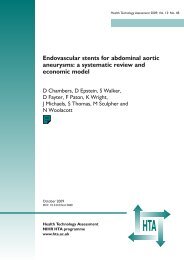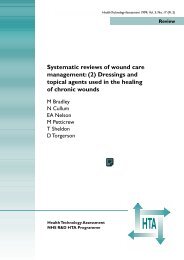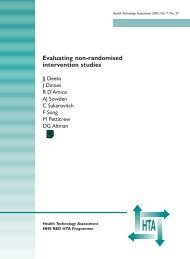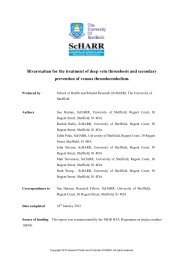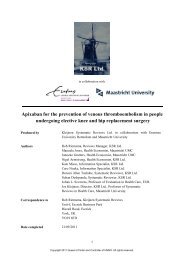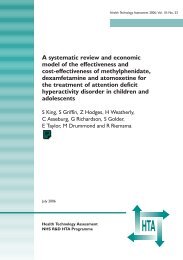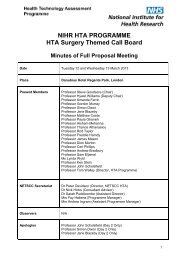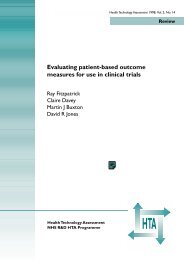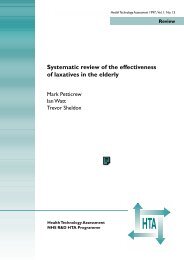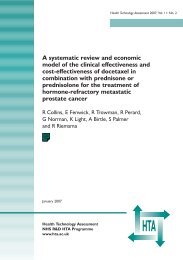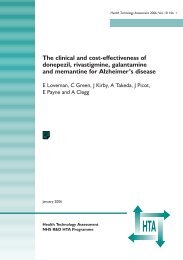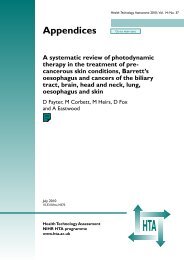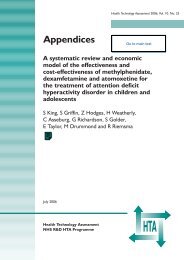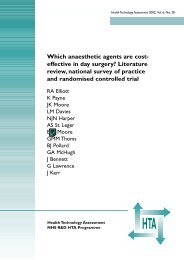How far does screening women for domestic (partner) - NIHR Health ...
How far does screening women for domestic (partner) - NIHR Health ...
How far does screening women for domestic (partner) - NIHR Health ...
You also want an ePaper? Increase the reach of your titles
YUMPU automatically turns print PDFs into web optimized ePapers that Google loves.
44<br />
Review Question III<br />
Abuse status<br />
Seven quantitative studies reported results by abuse<br />
status, and there was no consistent difference in<br />
acceptability by abuse status, although several<br />
found that a lower proportion of <strong>women</strong> with<br />
a history of <strong>partner</strong> violence were in favour of<br />
<strong>screening</strong> compared with <strong>women</strong> without that<br />
history. Caralis and Musialowski reported that 77%<br />
of non-abused <strong>women</strong> and 70% of abused <strong>women</strong><br />
agreed with <strong>screening</strong>. 109 Glass et al. reported that<br />
80% of <strong>women</strong> who were acutely abused or who<br />
were physically or sexually abused in the past year<br />
agreed with routine <strong>screening</strong> compared with 89%<br />
of <strong>women</strong> who reported a lifetime history of abuse<br />
or who reported no <strong>partner</strong> violence. 105 Zeitler<br />
and colleagues reported a similar result: <strong>women</strong><br />
who had experienced physical violence in the last<br />
year were significantly less likely to report that they<br />
felt it was a good idea <strong>for</strong> health-care providers to<br />
ask all <strong>women</strong> about violence; but even so, 80%<br />
of this group were in favour of all <strong>women</strong> being<br />
asked. 115 <strong>How</strong>ever, Friedman and colleagues found<br />
that 80% of those who reported sexual abuse<br />
favoured routine physician enquiry about sexual<br />
abuse compared with 64% of those who reported<br />
never being sexually abused. 110 In the same study,<br />
patients who reported abuse were just as likely to<br />
favour routine enquiry as patients who reported<br />
never being abused. Gielen and colleagues found<br />
that 48% percent of their sample agreed that<br />
health-care providers should routinely screen all<br />
<strong>women</strong>, with abused <strong>women</strong> more likely than nonabused<br />
<strong>women</strong> to support this policy (54% versus<br />
42%), 111 which concurred with the findings of Sethi<br />
and colleagues that 43% of accident and emergency<br />
department patients with a history of abuse<br />
thought that <strong>women</strong> should always be asked about<br />
experience of <strong>partner</strong> violence, compared with 30%<br />
among those who had not been abused. 48<br />
Screening settings<br />
There were no consistent differences in<br />
acceptability of <strong>screening</strong> by health-care setting.<br />
Most of the studies were conducted in various<br />
hospital settings, with some in general practices,<br />
in refuges or where <strong>women</strong> attended their support<br />
groups; one was in a family planning clinic and<br />
some included different settings. In several of<br />
the qualitative studies, in<strong>for</strong>mants did say that<br />
they would prefer <strong>screening</strong> to be carried out<br />
by a clinician with whom they already had a<br />
relationship, which implies that primary care is<br />
a more acceptable context than an accident and<br />
emergency department. This finding also implies<br />
that it may be less appropriate to ask about<br />
abuse at the first antenatal appointment than at<br />
subsequent appointments.<br />
Method of administering<br />
<strong>screening</strong> questions<br />
Most quantitative studies did not test acceptability<br />
of <strong>screening</strong> in relation to <strong>screening</strong> modality.<br />
Those that did and the qualitative studies found a<br />
range of preferences; there was no single preferred<br />
modality.<br />
Type of health-care professional<br />
Acceptability of <strong>screening</strong> may vary according<br />
to the gender and the profession of the healthcare<br />
provider asking the questions. Some <strong>women</strong><br />
preferred being screened by female health-care<br />
professionals; however, the qualitative studies<br />
found that most <strong>women</strong> felt that a professional’s<br />
interpersonal skills were more important than their<br />
gender or profession. Others voiced a preference<br />
<strong>for</strong> being screened by older health-care providers<br />
and doctors. Richardson and colleagues 41 found<br />
that 20% of <strong>women</strong> reported that they would mind<br />
being asked by their general practitioner about<br />
abuse or violence in their relationship if they had<br />
come about something else, with 23% objecting to a<br />
nurse asking; 42% reported that they would find it<br />
easier to discuss these issues with a woman doctor,<br />
and 3% expressed a preference <strong>for</strong> a male doctor.<br />
Romito and colleagues found that <strong>women</strong>’s<br />
responses concerning who they would like to<br />
discuss violence issues with ranged from (more<br />
than one answer was possible) the family doctor<br />
(54%), a psychologist (28%), <strong>women</strong> who had<br />
similar experiences (22%), a social worker (9%)<br />
and the police (7%). 107 Webster and colleagues 116<br />
also reported a range of responses from <strong>women</strong><br />
when asked about which health-care professionals<br />
should screen <strong>for</strong> <strong>partner</strong> violence: 1068 (65%)<br />
of the <strong>women</strong> nominated midwives, 1055 (64%)<br />
nominated general practitioners, 809 (49%)<br />
selected social workers, and 771 (47%) selected<br />
hospital doctors. Only 42 (2%) thought no one<br />
should ask. A number of <strong>women</strong> wrote comments<br />
such as ‘anyone who cares should ask’.<br />
From the qualitative studies it seems that in<br />
general <strong>women</strong> gain a sense of support and<br />
relief from discussing their situation with a<br />
health-care professional. Some <strong>women</strong> found<br />
it more acceptable to be screened by a healthcare<br />
professional where there was an alreadyestablished<br />
relationship and trust had been built



